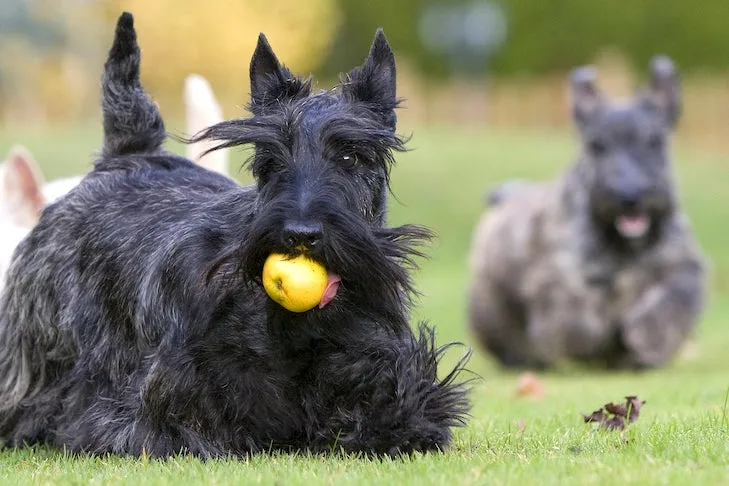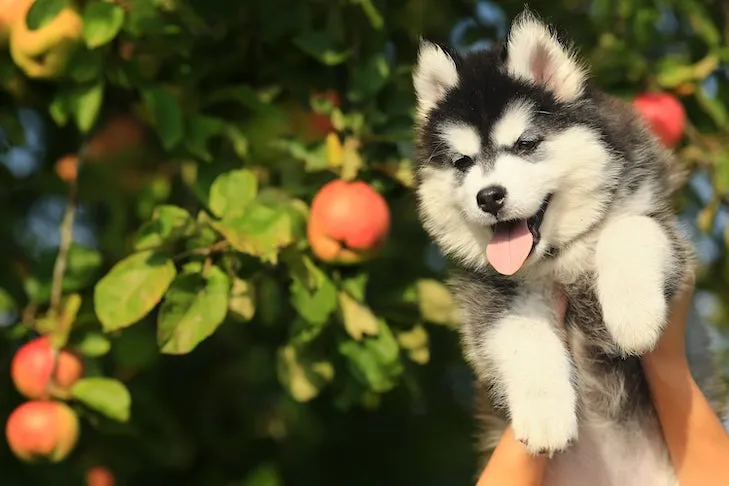It’s a common impulse for dog owners to share their favorite snacks with their canine companions. If a food is safe for us, it must be safe for them, right? Unfortunately, this isn’t always the case. Dogs have different digestive systems and dietary needs than humans, and some human foods can be not just unhealthy but downright dangerous for them. This is particularly true when it comes to fruits. While many fruits can be beneficial and enjoyable treats for dogs in moderation, a critical few pose significant health risks. Understanding What Fruits Can Dogs Not Have is paramount to ensuring their safety and well-being.
As omnivores, dogs don’t strictly need fruits or vegetables in their diet, but dog-safe options can serve as excellent, healthy treats. However, certain fruits contain compounds, seeds, or parts that are toxic or can cause severe health problems, ranging from digestive upset to life-threatening conditions. Therefore, it’s crucial to know which fruits to keep strictly away from your furry friend. This guide will provide a comprehensive overview of fruits that dogs absolutely should not consume, as well as those that are safe in moderation, to help you make informed decisions about your dog’s diet. For a broader understanding of what your dog can eat, explore what can u feed your dog and what can you give a dog to eat.
Fruits Dogs Can Safely Enjoy in Moderation
Before diving into what fruits dogs cannot have, it’s beneficial to know which ones are generally safe. These fruits, when offered in appropriate quantities, can provide valuable vitamins, minerals, and antioxidants.
Apples
Apples are a fantastic source of vitamins A and C, along with dietary fiber. They are low in protein and fat, making them an ideal snack. Always remember to remove the seeds and core before offering apples to your dog, as the seeds contain trace amounts of cyanide. Frozen apple slices can be a refreshing treat on a warm day.
 Scottish Terriers playing in the grass.
Scottish Terriers playing in the grass.
Bananas
Bananas are a low-calorie treat that dogs can enjoy in moderation. They are rich in potassium, vitamins, biotin, fiber, and copper, while being low in cholesterol and sodium. Due to their sugar content, they should be given as an occasional treat rather than a staple in their diet.
Blueberries
These tiny powerhouses are packed with antioxidants that protect cells from damage, and they also provide fiber and phytochemicals. Blueberries are a great addition to a dog’s diet as an occasional healthy snack.
Cantaloupe
Cantaloupe is nutritious, low in calories, and hydrating due to its high water content. It also provides fiber. However, its high sugar content means it should be given sparingly, especially to overweight dogs or those with diabetes.
Cranberries
Both fresh and dried cranberries can be offered to dogs in small amounts. Be mindful of sweetened dried cranberries, as they can add unnecessary sugar to your dog’s diet. Unsweetened versions are preferable. Overconsumption can lead to an upset stomach.
Cucumbers
Cucumbers are an excellent choice for overweight dogs as they are very low in carbohydrates and fat, and high in water content for hydration. They also offer vitamins K, C, and B1, along with minerals. Frozen cucumber slices can be a great cooling treat.
Mango
This tropical delight is rich in vitamins A, B6, C, and E, as well as potassium and carotenoids. Crucially, the large, hard pit must be removed as it can be a choking hazard and contains small amounts of cyanide. Like bananas, mangoes are high in sugar and should be a treat.
 Dog cucumber
Dog cucumber
Oranges
Oranges are a good source of vitamin C, potassium, and fiber. While veterinarians deem them safe, many dogs are deterred by the strong citrus scent and taste. Only the flesh should be offered, with the peel and seeds removed.
Peaches
Fresh or frozen peaches, with the pit completely removed, can be a good source of fiber and vitamin A. The pit contains cyanide and is a choking risk, so it must be discarded safely. Canned peaches, often packed in sugary syrups, should be avoided.
 Siberian Husky puppy being held up in front of an apple tree.
Siberian Husky puppy being held up in front of an apple tree.
Pears
Pears offer copper, vitamins C and K, and fiber. Like apples and peaches, the core and seeds should be removed due to the presence of cyanide. Avoid canned pears packed in syrup.
Pineapple
Small portions of fresh pineapple, with the tough exterior and crown removed, can be a sweet treat for dogs. It contains vitamins, minerals, fiber, and bromelain, an enzyme that aids protein absorption. Opt for fresh over canned pineapple in syrup.
Pumpkin
Pure pumpkin is highly beneficial for dogs, known for its ability to relieve both diarrhea and constipation. Ensure you are using 100% pure pumpkin puree and not pumpkin pie filling, which can contain spices harmful to dogs. Roasted pumpkin flesh is also a good option.
Raspberries
Raspberries are safe for dogs in moderation. They are rich in antioxidants, fiber, manganese, and vitamin C, and have anti-inflammatory properties beneficial for older dogs. However, they contain small amounts of xylitol, so limit intake to about 8 ounces.
Strawberries
Strawberries are a good source of fiber and vitamin C. They also contain an enzyme that may help whiten your dog’s teeth. Like other fruits, they contain natural sugars and should be offered in moderation.
 Pembroke Welsh corgi and strawberry
Pembroke Welsh corgi and strawberry
Watermelon
Watermelon is a hydrating treat, composed of about 92% water. It’s also a good source of vitamins A, B-6, and C, and potassium. Always remove the rind and seeds, as these can cause intestinal blockages.
What Fruits Can Dogs Not Have?
Certain fruits pose significant dangers to dogs due to toxins, indigestible parts, or compounds that can cause severe health issues. Understanding what fruits can dogs not have is crucial for preventing emergencies.
Avocado
While avocados are a healthy fat source for humans, they contain a substance called persin, primarily found in the pit, skin, and leaves, which is toxic to dogs and can cause vomiting and diarrhea. Even the flesh, while containing less persin, is high in fat and can lead to gastrointestinal upset or pancreatitis if consumed in large quantities.
Cherries
The flesh of cherries is safe for dogs in small amounts, but the pit, stem, and leaves of the cherry plant contain cyanide. Ingesting cherry pits or a large quantity of the plant can lead to cyanide poisoning, a serious medical emergency. Symptoms include difficulty breathing, dilated pupils, and red gums. Always secure discarded pits from your dog.
Grapes and Raisins
Grapes and raisins are among the most dangerous fruits for dogs. Even a small amount can cause severe, acute kidney failure, regardless of the dog’s breed, sex, or age. If you suspect your dog has ingested grapes or raisins, contact your veterinarian immediately.
Tomatoes
While the ripe flesh of a tomato is generally safe, the green parts of the tomato plant, including the leaves and stems, contain solanine. Solanine is a toxic compound that can cause gastrointestinal upset and other health problems in dogs. To be safe, it’s best to prevent dogs from accessing tomato plants altogether.

Frequently Asked Questions About Fruits for Dogs
Can my dog eat fruit salad?
Fruit salad can be a minefield for dog owners. While some fruits in a salad might be safe, others, like grapes, cherries, or avocados, can be toxic. It’s best to avoid giving your dog mixed fruit salads unless you can meticulously identify and remove all unsafe ingredients. Stick to offering individual, confirmed-safe fruits.
How much fruit can I give my dog?
Fruit should always be given as a treat, not a staple food. A good rule of thumb is that treats should not make up more than 10% of your dog’s daily caloric intake. For most fruits, small, bite-sized pieces offered a few times a week are sufficient. Always consider your dog’s size, breed, and overall health when determining portion sizes. For more guidance on safe feeding, refer to what are the best human foods for dogs and what can dogs eat peanut butter.
What should I do if my dog eats a fruit they shouldn’t have?
If you suspect your dog has ingested a toxic fruit, such as grapes, raisins, or avocado, contact your veterinarian or an emergency animal hospital immediately. Do not wait for symptoms to appear. Be prepared to tell them what your dog ate, how much, and when. Early intervention is key to a positive outcome.
Are dried fruits safe for dogs?
Dried fruits often have a concentrated sugar content and can pose choking hazards if not properly prepared. Some dried fruits, like raisins, are extremely toxic. Generally, it’s safer to stick to fresh or frozen fruits in moderation, and always avoid dried versions of fruits that are on the toxic list.
Conclusion
While the world of human foods can seem tempting to share with our canine companions, caution is always advised. Understanding what fruits can dogs not have is a vital part of responsible pet ownership. By being aware of the specific fruits that are toxic or potentially harmful, you can prevent dangerous situations and ensure your dog remains healthy and happy. Always prioritize fruits known to be safe and offer them in moderation as occasional treats. When in doubt, consult your veterinarian for personalized dietary advice for your beloved pet.
References
- American Kennel Club (AKC). (n.d.). Human Foods Dogs Can and Can’t Eat. Retrieved from https://www.akc.org/expert-advice/nutrition/human-foods-dogs-can-and-cant-eat/
- American Kennel Club (AKC). (n.d.). Can Dogs Eat Apples? Retrieved from https://www.akc.org/expert-advice/nutrition/can-dogs-eat-apples/
- American Kennel Club (AKC). (n.d.). Can Dogs Eat Bananas? Retrieved from https://www.akc.org/expert-advice/nutrition/can-dogs-eat-bananas/
- American Kennel Club (AKC). (n.d.). Can Dogs Eat Blueberries? Retrieved from https://www.akc.org/expert-advice/nutrition/can-dogs-eat-blueberries/
- American Kennel Club (AKC). (n.d.). Can Dogs Eat Cantaloupe? Retrieved from https://www.akc.org/expert-advice/nutrition/can-dogs-eat-cantaloupe/
- American Kennel Club (AKC). (n.d.). Can Dogs Eat Cranberries? Retrieved from https://www.akc.org/expert-advice/nutrition/can-dogs-eat-cranberries/
- American Kennel Club (AKC). (n.d.). Can Dogs Eat Cucumbers? Retrieved from https://www.akc.org/expert-advice/nutrition/can-dogs-eat-cucumbers/
- American Kennel Club (AKC). (n.d.). Can Dogs Eat Mango? Retrieved from https://www.akc.org/expert-advice/nutrition/can-dogs-eat-mango/
- American Kennel Club (AKC). (n.d.). Can Dogs Eat Oranges? Retrieved from https://www.akc.org/expert-advice/nutrition/can-dogs-eat-oranges/
- American Kennel Club (AKC). (n.d.). Can Dogs Eat Peaches? Retrieved from https://www.akc.org/expert-advice/nutrition/can-dogs-eat-peaches/
- American Kennel Club (AKC). (n.d.). Can Dogs Eat Pears? Retrieved from https://www.akc.org/expert-advice/nutrition/can-dogs-eat-pears/
- American Kennel Club (AKC). (n.d.). Can Dogs Eat Pineapple? Retrieved from https://www.akc.org/expert-advice/nutrition/can-dogs-eat-pineapple/
- American Kennel Club (AKC). (n.d.). Can Dogs Eat Raspberries? Retrieved from https://www.akc.org/expert-advice/nutrition/can-my-dog-eat-raspberries/
- American Kennel Club (AKC). (n.d.). Feed Dog Strawberries. Retrieved from https://www.akc.org/expert-advice/nutrition/feed-dog-strawberries/
- American Kennel Club (AKC). (n.d.). Can Dogs Eat Watermelon? Retrieved from https://www.akc.org/expert-advice/nutrition/can-dogs-eat-watermelon/
- American Kennel Club (AKC). (n.d.). Can Dogs Eat Avocado? Retrieved from https://www.akc.org/expert-advice/nutrition/can-dogs-eat-avocado/
- American Kennel Club (AKC). (n.d.). Can Dogs Have Cherries? Retrieved from https://www.akc.org/expert-advice/nutrition/can-dogs-have-cherries/
- American Kennel Club (AKC). (n.d.). Can Dogs Eat Grapes? Retrieved from https://www.akc.org/expert-advice/nutrition/can-dogs-eat-grapes/
- American Kennel Club (AKC). (n.d.). Can Dogs Eat Tomatoes? Retrieved from https://www.akc.org/expert-advice/nutrition/can-dogs-eat-tomatoes/
